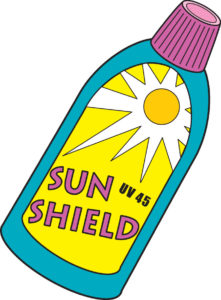 During this time of year, I am frequently asked by my patients to answer questions about sunscreen. As always, my patients keep me on my toes, which requires repetitive reviews of sunscreen studies, sunscreen controversies, and sunscreen news (real news and fake news!). Interpreting sunscreen studies can be complicated, and the issues often become heated and controversial. After all, we are talking about cancer and cancer prevention here, and we all want the truth. Not to mention, nobody wants to rub a lotion all over their skin (and certainly not their children’s!) that might cause cancer.
During this time of year, I am frequently asked by my patients to answer questions about sunscreen. As always, my patients keep me on my toes, which requires repetitive reviews of sunscreen studies, sunscreen controversies, and sunscreen news (real news and fake news!). Interpreting sunscreen studies can be complicated, and the issues often become heated and controversial. After all, we are talking about cancer and cancer prevention here, and we all want the truth. Not to mention, nobody wants to rub a lotion all over their skin (and certainly not their children’s!) that might cause cancer.
So, this year, I have decided again to review what we know about sunscreen, and equally important, to review what we don’t know about sunscreen. Here are the seven items that I would like my patients to know:
1.Yes, sunscreen prevents cancer
In 1992, 1621 people in Australia were randomly assigned to apply sunscreen daily, or to apply sunscreen only with “discretionary use”. The intervention lasted four years, and the participants were followed for ten. At the end of the study, the daily sunscreen users had HALF the incidence of melanoma compared to the discretionary users. So yes, to me that’s pretty good evidence that sunscreen prevents melanoma.
2.Sunscreen also prevents skin aging
In the same Australian study, participants’ hands were analyzed for microscopic signs of general skin aging, and the sunscreen group had less of it.
3.You need a sunscreen that blocks both UVA and UVB
UVA causes your skin to age. UVB causes sunburns. It is probably true that both can cause skin cancer.
4.Choose a sunscreen without retinyl palmitate
When it comes to the controversial issue of sunscreen causing skin cancer, retinyl palmitate is the smoking gun. Here is what we know. When hairless mice were exposed to ultraviolet light, those mice coated with a cream containing retinyl palmitate had more skin cancers. So, while one may claim that it’s never been demonstrated in people, I say just avoid it if you can.
5.Avoid spray sunscreens if possible
Yes, they’re easy. Yes they’re convenient. However, we know that they are more difficult to apply evenly and effectively, and we wonder if inhaling the chemicals might be harmful. This is still being studied. In the meantime, it is best to apply a lotion, rather than a spray.
6.Sunscreen may limit Vitamin D production
Our skin helps produce the active form of Vitamin D when exposed to UV light. So, if you use sunscreen regularly, and your diet is also low in Vitamin D, you should probably take a Vitamin D supplement. You may ask your doctor to check your Vitamin D level.
7.What is the best sunscreen on the market?
Easy. hats, rash guards, and umbrellas.
I hope this helps!
Off to the beach,
Dr. Van Dam